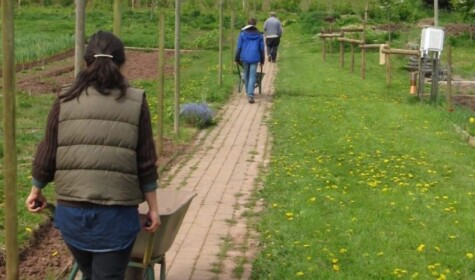If we want to eat a sustainable healthy diet, then locally grown, chemical-free vegetables are an essential component. But who is going to grow that healthy, tasty veg? There is a worrying dearth of training opportunities in the UK for people interested in becoming ‘growers’ – and it leaves the reality of sustainable food production with a doubtful future. While interest in growing sustainable food continues to increase, with a diverse array of young people and new entrants coming into farming, apprenticeships and training programmes in the UK are largely struggling to stay afloat. How are we going to grow the next generation of farmers, many of whom are entering agriculture without any background in it?
For many years, the Soil Association ran its Future Growers programme as an extended apprenticeship scheme. Participants spent two years as paid apprentices, on a range of organic farms, mentored by the farm’s head grower. They also participated in a series of weekend courses and farm visits for which they paid, covering all aspects of organic growing. Their wage as an apprentice, helped cover these fees. The combination provided extensive hands-on training and mentoring for participants. In 2015, the scheme was in high demand, and according to Hilary Chester-Master of Abbey Home Farm, who sat on the Future Growers steering group for many years: “for one apprenticeship place they had twenty applicants, and quite a lot from abroad.” However, the scheme struggled to stay afloat financially and had a continuing problem with finding host farms that could afford to pay apprentices all year round. The apprenticeships ended in 2016 and the Soil Association reworked the Future Growers into a six month ‘traineeship’, running through spring and summer, and comprised of six weekend seminar and training sessions at host farms, along with access to specialist online resources. Cost is between £1500-£1920 for the traineeship, depending on income.
Hilary Chester-Master fervently believes the two-year apprenticeship is the best way to train growers. “I feel if someone’s aim is to become a grower, they need to spend at least two years on the same holding, so they can see that one year there may be all sorts of different successes and problems than in the next year.” Hilary believes that the future of sustainable food depends on training new entrants, and she still independently offers apprenticeships at Abbey Home Farm. “We’re lucky we can [still host apprentices]; we can afford to because we’ve got the shop and the café and the education centre and everything props everything else up.”
According to Nathan Richards, who runs Troed y Rhiw Organics, a horticulture holding in West Wales, there is a worryingly large skills gap, especially in small-scale sustainable horticulture. When Nathan decided to change career, moving from filmmaking to become a grower, he faced very few training options, so he organised his own placement on an organic farm. Now a farmer for nearly 15 years, Nathan wants to help train the next generation of growers; he feels it’s of vital importance for the future of food. He took on two Future Grower apprentices when the programme was running, giving them the opportunity to learn and work alongside him, gaining a practical grounding in growing food over several seasons. Nick Johnson, one of Nathan’s apprentices, is now a key part of Sheffield Organic Growers. But growers such as Nathan and Hilary who are passionate enough about education to take time out of their busy farming lives to pass on their knowledge are few and far between.

While less known, the Biodynamic Agricultural Collegehas active training programmes both online and hands-on. The Work Based Learning diploma course that it offers, which is similar to the apprenticeships of the early Future Growers, is a comprehensive training that gives students a genuine grounding in biodynamic farming or gardening both practically and theoretically. Currently there are 19 farms offering 25 work placements. Trainees apply to be employed on a farm or garden for two years and during this time receive 10 weeks of seminars, which are spread out at seasonally strategic times. Students also receive individual support from a mentor. The full training costs £10,080 for the two years, but their earnings mitigate the fees. The farms receive a training grant of £5000 in addition to training guidance, covered by the student fees. Of further value, the course offers a Level 3 Diploma qualification, accredited by the Crossfields Institute.
In the last few years, another innovative new model of grower education, Farm Start, has developed at a grassroots level. On the outskirts of Manchester, the Kindling Trust is running this farm incubator initiative, where people with an interest in starting their own commercial growing enterprise can gain skills, knowledge and confidence. The one-year programme is based on two growing sites where participants work alongside an experienced grower, as well as having classroom sessions that cover key topics on commercial-scale organic growing. Helen Woodcock, co-founder of the Kindling Trust, explains that “Accessibility is a crucial aspect of Farm Start. New entrants without their own land can access practical land-based training for £500(+VAT) per year on a part-time basis.” Farm Start is also an opportunity to test out business ideas on a small-scale, with the support of mentors, access to equipment and a growing market through Veg Box Peopleand Manchester Veg People. OrganicLea in London and Nourish Scotland are also setting up similar programmes.
There are also a growing number of short courses in the UK which can be early stepping stones into growing or that can help to broaden knowledge and skills for those already working. For example, Bridgewater College offers a 12-week course in organic principles and practices, and many local farms, gardens and gardening clubs offer their own courses and workshops. There is also an abundance of Permaculture Design courses across the country, which are particularly successful in engaging the urban population in growing due to the focus on small-scale production. In addition to this, the Diploma in Applied Permaculture Design allows people to extend their learning through a course of self-directed study. RegenAg offers courses for farmers and smallholders around the country with an emphasis on holistic management and soil health. Landbase offers short courses on rural living skills such as hedge-laying, composting, orchard planting and small-holding management.
Despite the fantastic opportunities described here, the UK is far behind other countries when it comes to grower education. For example, in France the Réseau National des Espaces-Test Agricoles (National Network of Farm Incubators) aims to promote incubator farms as a way of making entry into farming easier. In California, the Center for Land-based Learning provides a range of opportunities in 17 counties across California. In Canada, the original Farm Start was created 10 years ago and has provided inspiration for the Kindling Trust’s version.
In many countries, the government funds farmer training, notes Helen Woodcock. She described meeting farmers from the Netherlands, who were paid by the government to train new growers on their farms. “This both values the knowledge and experience of the growers and recognises the time that it takes to train new entrants. This is really important as small sustainable growers can barely afford to pay their own wages never mind wages for apprentices, but they are exactly the people we need to learn from.” In the UK, this kind of support does not exist.
If we are to build momentum in local sustainable vegetable production in the UK, then we need to start to value growing as a profession. This starts by providing training opportunities for new entrants into farming that are affordable and linking this with employment. Mentoring and skills development is critical and it must be available in many different forms to support the variety of people who want to be the country’s next generation of future growers.
We’d love to hear about your opinions and experiences of grower trainings in the UK! Please add your comments below.
Photograph: Kai Lange







